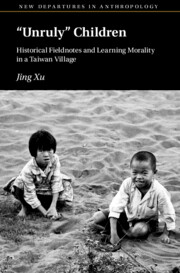Book contents
- “Unruly” Children
- New Departures in Anthropology
- “Unruly” Children
- Copyright page
- Dedication
- Contents
- Figures
- Tables
- Foreword
- Preface
- Acknowledgments
- Notes on Transcription and Terminology
- Abbreviations
- Introduction
- One Fieldwork beyond Fieldwork
- Two Crime and Punishment
- Three Playful Creatures
- Four Gendered Morality
- Five Care and Rivalry
- Epilogue: Taking Children Seriously
- Afterword
- Appendix: Topic Modeling List (Corpus: Child Observation)
- Glossary
- References
- Index
Introduction
Learning Morality in a Taiwan Village
Published online by Cambridge University Press: 31 October 2024
- “Unruly” Children
- New Departures in Anthropology
- “Unruly” Children
- Copyright page
- Dedication
- Contents
- Figures
- Tables
- Foreword
- Preface
- Acknowledgments
- Notes on Transcription and Terminology
- Abbreviations
- Introduction
- One Fieldwork beyond Fieldwork
- Two Crime and Punishment
- Three Playful Creatures
- Four Gendered Morality
- Five Care and Rivalry
- Epilogue: Taking Children Seriously
- Afterword
- Appendix: Topic Modeling List (Corpus: Child Observation)
- Glossary
- References
- Index
Summary
This chapter introduces my research questions, framework, and main findings. It begins with two striking vignettes to engage the readers and outline the significance of the two basic questions that motivate this book and intersect at children's social cognition: How do humans learn morality? How do we make sense of fieldnotes? The chapter situates the book in intellectual history, including the Wolfs’ original research, its connections to the Six Cultures Study, and its legacies. It then presents a new framework of cognitive anthropology distinctive from the behaviorist paradigm that motivated the original research. I situate the book in three broad streams of discussions: (1) theoretical conversations between anthropology and psychology on morality; (2) cross-cultural research on childhood learning; (3) studies of Chinese kinship, families, and childhood. I explain why it is important to study children to understand morality, human relatedness, and cultural transmission. I also make the case for reanalyzing historical fieldnotes. I then lay out a methodology that incorporates computational approaches into ethnography, summarize my main arguments, and outline the book structure.
Keywords
- Type
- Chapter
- Information
- ‘Unruly’ ChildrenHistorical Fieldnotes and Learning Morality in a Taiwan Village, pp. 1 - 35Publisher: Cambridge University PressPrint publication year: 2024

